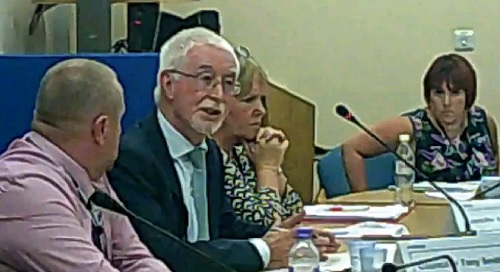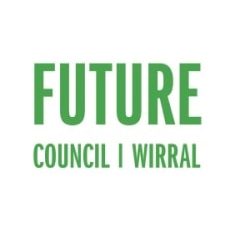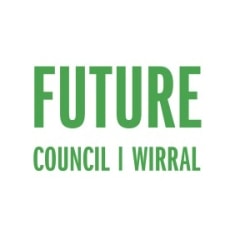Wirral Council publish draft minutes on 4th September Cabinet decision on Lyndale School

The author of this piece has sent a letter following the pre-application protocol for judicial review to Wirral Council. However as no case has yet been filed, the matter is not sub judice. I felt it was however best to mention this as an interest in the below piece.
Wirral Council has published the draft minutes of the special Cabinet meeting held on the 4th September 2014 to consider the future of Lyndale School.
Councillors have between the date the draft minutes were published and the 18th September 2014 to decide whether they wish to “call in” the Cabinet decision and have it reviewed by a meeting of the Coordinating Committee as long as a minimum of six (out of sixty-six) councillors call for it to be called in.
A copy of the draft minutes for the Cabinet meeting are below.
| 40. | Members’ Code of Conduct – Declarations of Interest
Members of the Cabinet are asked to consider whether they have any disclosable pecuniary or non pecuniary interests in connection with any item(s) on this agenda and, if so, to declare them and state the nature of the interest. Minutes: Councillor S Whittingham declared a personal interest by virtue of his appointment as a school governor at Millbrook Special School.
|
| 41. | Minutes
The minutes of the last meeting have been printed and published. Any matters called in will be reported at the meeting.
RECOMMENDATION: That the minutes be approved and adopted. Minutes: RESOLVED:
That the minutes of the last meeting held on 7th July 2014 be approved as a correct record.
|
| 42. | Chairs Announcement
Minutes: The Leader of the Councillor indicated that following requests received, prior to the consideration of TheLyndale School item, the Cabinet will be show a video from The Lyndale School first |
| 43. | Council Referral: The Lyndale School
At its meeting held on 14 July 2014, Council considered a Notice of Motion proposed by Councillor Paul Hayes in relation to The Lyndale School. Council requested the Cabinet consider this along with all options relating to Lyndale School together with the outcome of the consultation exercise at a special meeting. (Minute 18 is attached)
Minutes: At the meeting of the Council held on 14 July 2014 (minute 18 refers), the attached Notice of Motion, proposed by Councillor Paul Hayes and seconded by Councillor Jeff Green, in relation to The Lyndale School, was debated.
Council requested the Cabinet consider this along with all options relating to the Lyndale School together with the outcome of the consultation exercise at a special meeting.
RESOLVED:
That the Notice of Motion in the relation to The Lyndale School be noted. |
| 44. | Outcome of Lyndale School Consultation
Additional documents:
Minutes: Prior to consideration of the item the Cabinet considered a video which had been submitted by Ms D. Hughes.
The Leader of the Council, having welcomed everyone to the meeting, invited Ms Zoe Anderson, Parent Governor and parent of a child at The Lyndale School to address the Cabinet. Ms Anderson, spoke on behalf of the staff and parents of the school and spoke of the particular needs of the children at The Lyndale and gave a personal account of her own child’s needs and experiences which she felt could only be provided for at The Lyndale School.
Speaking on behalf of parents Ms Anderson made representations in strong support of retaining The Lyndale School, the consultation responses, the expert report and the proposed options.
Ms Anderson specifically stated that the staff at The Lyndale had gained the trust of all the parents to look after their child’s medical, physical and educational needs – which was the fundamental concern. Ms Anderson highlighted the excellent support, care and education provided all the children at The Lyndale School. The school had excellent facilities including very good outside space to which the children had full access. Ms Anderson commented that The Lyndale School provided the children with a wonderful sensory environment that was safe and relaxed. She asked that a full review be undertaken of the care given to each individual child by staff at The Lyndale School.
Ms Anderson commented that the school’s staff provided specialised care, support and education; they were adept at communicating effectively with the children – skills which took many years to perfect. She stated that it took time to build up trust, and it was unfair that staff did not know what was to happen from week to week. The school played an integral part in the community, and interacted and participated with other neighbouring schools. Ms Anderson shared/circulated a Parents Survey that had been undertaken that showed parents wanted their children to remain at The Lyndale School.
Within her representations, Ms Anderson asked that the funding bands be revisited to reflect the needs of each individual child that attended the school. She highlighted that the school had previously asked for the Schools Forum to revisit the schools banding due to the change in circumstances.
In relation to the consultation document, Ms Anderson reiterated that The Lyndale School was not looking for the Council to enhance the funding but to maintain the funding that was already in place. Ms Anderson stated that parents had confidence in the school but not the process that the parents were involved in. She reminded Cabinet Members that the Council had a legal obligation to listen to the parents under the SEN Test. Ms Anderson drew an analogy with medical consultants who always ask parents for their views and thoughts.
Ms Anderson stated that consultation responses clearly showed overwhelming support for The Lyndale School to be retained. Comments were also made in relation to the consultant (Ms L Wright) and her report. Concerns were expressed that the ethos of The Lyndale School would not be replicated at either the Stanley orElleray Park Schools, not least because the children attending these schools had different needs. Ms Anderson stated that the suitability of expanding these two schools was based upon assumptions, which was not evidence; and that simply providing training to staff was no substitute for experience. Concerns were raised over health and safety issues and the need for both schools to be upgraded at considerable cost.
Ms Anderson concluded by stating that experienced and effective staff would leave due to the uncertainty and proposals. There would be no investment in The Lyndale School and it would instead stagnate; and parents would not want or be willing to subject their children to such an outcome.
The Leader of the Council thanked Ms Hughes for her informative video and Ms Anderson for her representations. He acknowledged and confirmed that he appreciated the time and effort expended by everyone in supporting the school and pupils. He indicated that Members of the Cabinet had read all reports, representations and the feedback received in relation to The Lyndale School and had also met with parents and staff. He sincerely thanked all staff and parents.
Introduced by the Director of Children’s Services, the Cabinet considered the report from the Director of Children’s Services which detailed the outcome of the consultation on the closure of The Lyndale School.
The report outlined the responses received during the consultation, reviewed alternative options identified, as well as detailing the outcome of the SEN Improvement Test.
The report indicated that, on 16 January 2014 (Minute 129 refers) Cabinet agreed to undertake a consultation on the closure of The Lyndale School. The consultation closed in June 2014. The report recommended that Cabinet considered the contents of the report and made a decision on this matter.
The Director of Children’s Services commended the care, quality and passion of the staff at The Lyndale School which was endorsed by Ofsted and noted their excellent quality of care towards all pupils who attended the school and indicated that she along with her Department would be working closely with all staff and parents to end the uncertainty surrounding the future of The Lyndale School and bring this to a conclusion as soon as possible for both children, parents, and staff.
In relation to consultation, the Director of Children’s Services indicated that she had met with parents,’ school staff, school governors and an MP; Councillors had also undertaken site visits to the schools and various public meetings had been held to encourage consultation and feedback.
In relation to concerns raised by parents regarding health and safety at Elleray Park and Stanley School these were sent to both Headteachers of the schools who responded to the Council who then responded to the parents questions.
In relation to staff, the Director of Children’s Services indicated that she had spoken to all staff at The Lyndale School when she visited as and reiterated that those affected would be fully supported throughout the transition as far as the Council can do.
In response to comments from parents, the Director of Children’s Services indicated that there had been no evidence to suggest that parents had been steered away from The Lyndale School by Children’s Services officers although accepted that due to the uncertainty that surrounded The Lyndale School this could be a contributing factor.
In relation to the option in which it was proposed that The Lyndale School close and a new PMLD base be opened on the new Foxfield site, the Director of Children’s Services indicated that she had recently spoken with theHeadteacher of Foxfield School who had spoken with his Chair of Governors and the Headteacher indicated that it would be inappropriate to have a primary setting even in a separate unit, therefore this option could not be considered.
The Chair welcomed Ms Lynn Wright, Independent Consultant, who had been appointed to consult on the proposal to close The Lyndale School, the options, including those which had emerged throughout the consultation period, and give her view on the SEN Improvement Test.
Ms Wright gave feedback on her findings in relation to each of the options considered; the full report was attached as an appendix.
In response to the Council’s intention to increase the closure period from 2015 to 2016, Ms Wright advised against this as this would have huge implications for the pupils and staff that already had gone through a long period of uncertainty. Ms Wright indicated that the funding system had changed nationally and that schools that were no longer viable or sustainable should not be allowed to continue.
The Leader of the Council thanked Ms Wright for her detailed report and feedback on the considered options.
The Cabinet Member for Children and Family Services thanked all staff and parents for their comments and feedback and indicated that the Cabinet had considered all options in a transparent manner and had listened carefully to what had been said. Cabinet Members were reminded to have regard to the Council Referral under the previous Agenda Item in considering this matter. The Cabinet Member reiterated the need for stability at The Lyndale School and that this had been looked at for both financial and educational reasons, which had to be taken into consideration due to the funding formula changes introduced by Central Government.
Councillor T Smith moved the following motion duly seconded by G. Davies:
(1) Cabinet thanks all those who have participated in the consultation exercise, with particular regard to submissions from parents of children at The Lyndale School;
(2) Having reviewed the responses received during the consultation process, analysed the alternative options and applied the SEN Improvement Test, it is recommended that:
and outlined the following reasons for the motion.
Having looked at all the options, and applied the SEN Improvement Test, it is our opinion that, while we recognise the special place that The Lyndale School has in the affection of parents and children, the continued operation and maintenance of a school of this size will not meet the future educational needs of the children, nor is a financially viable option, especially when there are good alternative options available.
The Council has a responsibility to ensure for the sustainable future provision of education for the pupils of The Lyndale School. In addition, we have to manage resources effectively for all schools and the school population.
This was a difficult decision to make, and we would like to affirm our continued intention to work positively with the families and the children affected, and reassure parents of our continued commitment to their child’s wellbeing and education.
Councillor P. Davies moved an amendment, duly seconded by Councillor Mooney, that an additional point be included in the motion, namely:
which was carried unanimously.
IT WAS RESOLVED: That
(1) Cabinet thanks all those who have participated in the consultation exercise, with particular regard to submissions from parents of children at The Lyndale School;
(2) Having reviewed the responses received during the consultation process, analysed the alternative options and applied the SEN Improvement Test, it is recommended that:
Supporting documents:
|
If you click on any of these buttons below, you’ll be doing me a favour by sharing this article with other people. Thanks:


